Sanctoandrea Surname Ancestry ResultsOur indexes 1000-1999 include entries for the spelling 'sanctoandrea'. In the period you have requested, we have the following 15 records (displaying 1 to 10): Buy all | | | Get all 15 records to view, to save and print for £60.00 |
These sample scans are from the original record. You will get scans of the full pages or articles where the surname you searched for has been found. Your web browser may prevent the sample windows from opening; in this case please change your browser settings to allow pop-up windows from this site. Grantees of royal lands and pardons
(1175-1176)
The Great Rolls of the Pipe are the central record of the crown compiling returns of income and expenditure from the sheriffs and farmers of the various English counties or shires. This is the oldest series of public records, and the earliest surviving instances of many surnames are found in the Pipe Rolls. This is the roll for the 22nd year of the reign of king Henry II, that is, accounting for the year from Michaelmas 1175 to Michaelmas 1176. Most (but not all) of the entries in which names appear relate to payments for grants of land and fines or pardons. The large number of payments of fines for forest transgressions has been interpreted as a form of compounding for pardons by those who had rebelled during the recent years of unrest; or, looking at it in a different way, a form of extortion from the king in order to raise money to pay off the mercenaries with whose help he had quelled the rebellions. There is a separate return in each year for each shire, the name of the shire being here printed at the top of each page. Wales was still independent, in separate kingdoms, at this period, and is not included, except for 'Herefordshire in Wales'. SANCTOANDREA. Cost: £4.00.  | Sample scan, click to enlarge
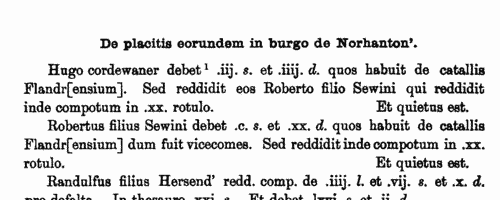
| Grantees of royal lands and pardons
(1176-1177)
The Great Rolls of the Pipe are the central record of the crown compiling returns of income and expenditure from the sheriffs and farmers of the various English counties or shires. This is the oldest series of public records, and the earliest surviving instances of many surnames are found in the Pipe Rolls. This is the roll for the 23rd year of the reign of king Henry II, that is, accounting for the year from Michaelmas 1176 to Michaelmas 1177. Most (but not all) of the entries in which names appear relate to payments for grants of land and fines or pardons. The large number of payments of fines for forest transgressions has been interpreted as a form of compounding for pardons by those who had rebelled during the recent years of unrest. There is a separate return in each year for each shire, the name of the shire being here printed at the top of each page. Wales was still independent, in separate kingdoms, at this period, and is not included, except for 'Herefordshire in Wales'. SANCTOANDREA. Cost: £4.00.  | Sample scan, click to enlarge
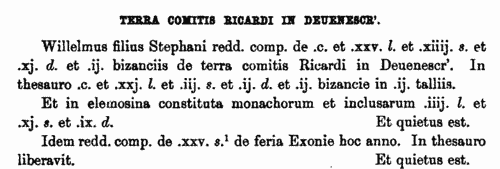
| Dublin Merchants
(1180-1200)
In 1870 documents of the Anglo-Normans in Ireland from 1172 to 1320, edited by J. T. Gilbert, Secretary of the Public Record Office of Ireland, were printed in the Rerum Britannicarum Medii Aevi Scriptores series. These include transcripts of the Dublin guild merchant rolls surviving from that period, which we have now indexed. This, the earliest of these rolls, is damaged, but can be dated to about 1180 to 1200. Those named, although enjoying the privilege of trading in Dublin, were not necessarily resident there, and in several cases a name will be followed by an English address, such as 'de Wigornia' (from Worcester).SANCTOANDREA. Cost: £6.00.  | Sample scan, click to enlarge
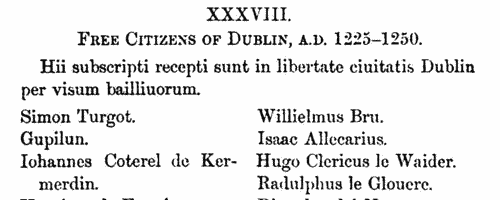
| Pipe Roll
(1241-1242)
The Great Rolls of the Pipe are the central record of the crown compiling returns of income and expenditure from the sheriffs and farmers of the various English counties or shires. This is the oldest series of public records, and the earliest surviving instances of many surnames are found in the Pipe Rolls. This is the roll for the 26th year of the reign of king Henry III, that is, accounting for the year from Michaelmas 1241 to Michaelmas 1242. Most (but not all) of the entries in which names appear relate to payments for grants of land and fines or pardons arising from the proceedings of the justices. The text was edited by Henry Lewin Cannon for Yale Historical Publications and printed in 1918. The name of the county is given at the head of each page, and variant spellings, omissions and additions found in the duplicate Chancellor's Roll [C. R.] are given in the footnotes.SANCTOANDREA. Cost: £4.00.  | Sample scan, click to enlarge
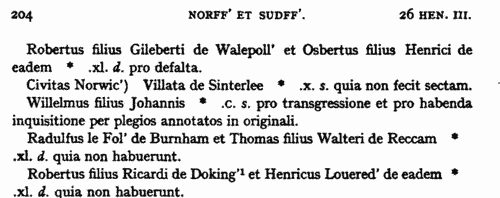
| Fine Rolls
(1216-1246)
The fine rolls of the 1st to 30th years of the reign of king Henry III record part of the government administration in England. These excerpts from the rolls list in transcript applications by plaintiffs for various writs (such as 'ad terminum' and 'pone') and for assizes to be held by the justices in eyre to look into their grievances. A fine of half a mark (6s 8d) or a mark (13s 4d) was usually levied; the cases are normally identified by county, and record that the appropriate sheriff had been notified. There are also more extensive records, in which more detail is given. The excerpts were made by the Record Commission and printed in 1835.SANCTOANDREA. Cost: £4.00.  | Sample scan, click to enlarge

| Guisborough Cartulary
(1119-1300)
The Augustinian (black canons) priory of the Blessed Virgin Mary at Guisborough (Gyseburne) near Middlesbrough in north Yorkshire, was founded about 1119 by Robert de Brus. The 1100 or so grants of land (mostly in Cleveland) made to the priory from then well into the 13th century were copied into a cartulary or chartulary which survives as Cottonian Manuscript Cleopatra d ii (British Library). This was edited by W. Brown and published by the Surtees Society from 1889. This first part contains the charters from folios 1 to 233, items I to DXCIII. The texts have been stripped of repetitious legal formulae, retaining the details of the grantors, the property, and the witnesses: so the individuals named are mainly local landowners and tenants, canons, servants and wellwishers of the monastery. The charters before 1250 are often undated.SANCTOANDREA. Cost: £4.00.  | Sample scan, click to enlarge
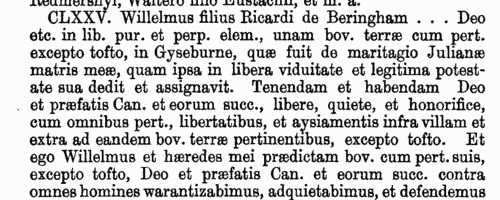
| Close Rolls
(1313-1318)
The close rolls of the 7th, 8th, 9th, 10th and 11th years of the reign of king Edward II record the main artery of government administration in England, the orders sent out day by day to individual officers, especially sheriffs of shires: they are an exceptionally rich source for so early a period. In amongst this official material, the rolls were also used as a way of recording many acknowledgments of private debts and contracts between individuals. Most of the contents relate to England, but there are also entries concerning Wales, Scotland, Ireland and the English possessions in France.SANCTOANDREA. Cost: £4.00.  | Sample scan, click to enlarge

| Grantees of offices, commissions and pardons
(1317-1321)
The Patent Rolls are the Chancery enrolments of royal letters patent. Those for the 11th to the 14th years of the reign of king Edward II (8 July 1317 to 7 July 1321) were edited for the Public Record Office by G. F. Handcock, and published in 1903. The main contents are royal commissions and grants; ratifications of ecclesiastical estates; writs of aid to royal servants and purveyors; and pardons. Most extensive are the commissions of oyer and terminer to justices to investigate complaints about specific crimes and wrongs in particular counties.SANCTOANDREA. Cost: £2.00.  | Sample scan, click to enlarge

| Charter Rolls
(1050-1326)
This abstract of the surviving charter rolls for 1300 to 1326, in the reigns of kings Edward I and II, was prepared by C. G. Crump and A. E. Stamp and published in 1908. The charter rolls not only recorded royal grants of lands, liberties and offices, but also enabled landowners to have their existing charters, their deeds of title, registered by the process of inspeximus and confirmation. After the Statute of Mortmain of 1279, this was of particular importance to religious houses, now greatly restricted in their ability to receive new donations of land, and anxious to prove title to their ancient property. Consequently, many charters of great age were copied onto the charter rolls.SANCTOANDREA. Cost: £4.00.  | Sample scan, click to enlarge

| Close Rolls
(1333-1337)
The close rolls of the 7th to 10th years of the reign of king Edward III, that is from 25 January 1333 to 24 January 1337, record the main artery of government administration in England, the orders sent out day by day to individual officers, especially sheriffs of shires: they are an exceptionally rich source for so early a period. In amongst this official material, the rolls were also used as a way of recording many acknowledgments of private debts and contracts between individuals. Most of the contents relate to England, but there are also entries concerning Wales, Scotland, Ireland and the English possessions in France: particularly Scotland, where the king was campaigning during this period. This calendar was prepared by A. B. Hinds of the Public Record Office and published in 1898.SANCTOANDREA. Cost: £4.00.  | Sample scan, click to enlarge

|
| 1 | 2 |  |
Research your ancestry, family history, genealogy and one-name study by direct access to original records and archives indexed by surname.
|












